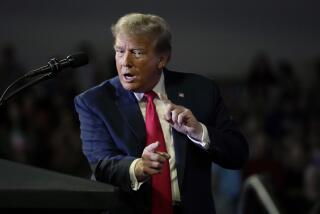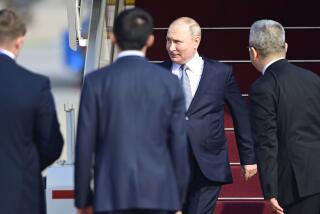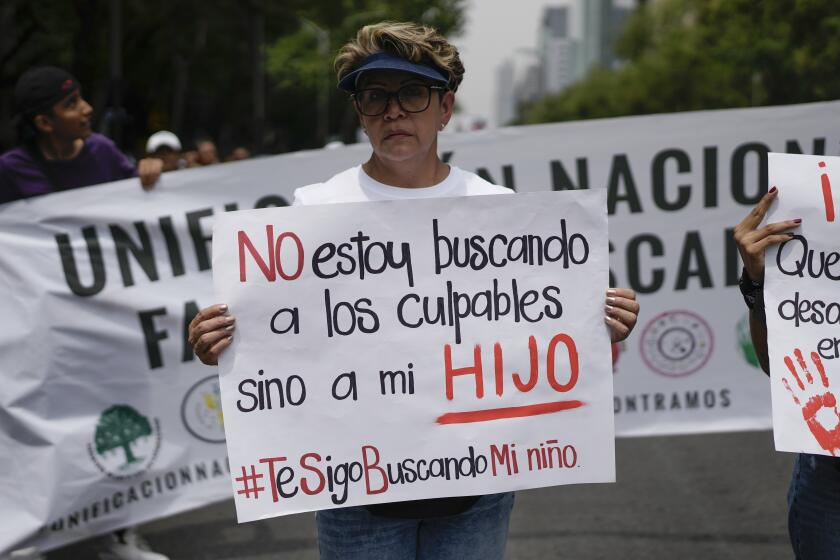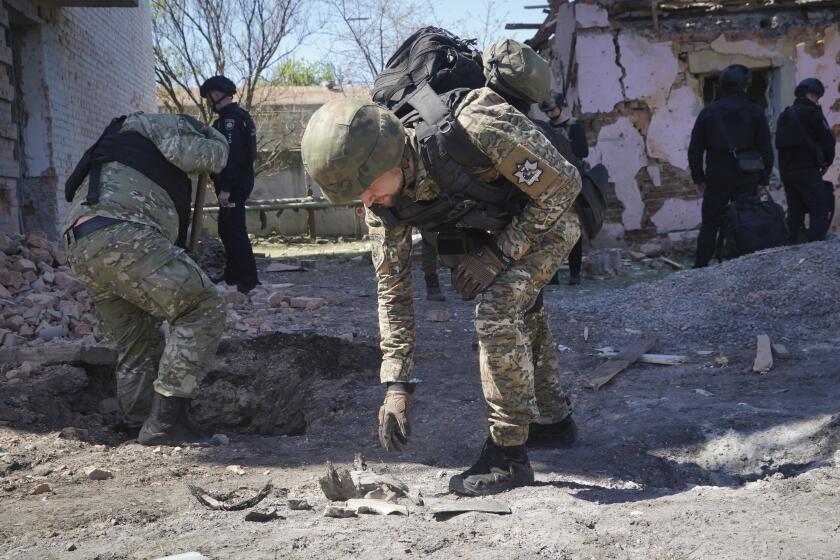Clinton, Yeltsin Plan Summit in March
The presidents of Russia and the United States agreed Thursday to hold their next summit in March, probably on U.S. soil, a spokesman for Russian President Boris N. Yeltsin said.
The date was announced following a 20-minute telephone conversation Thursday between Yeltsin and President Clinton, Itar-Tass news agency reported.
The summit, the latest in a series of friendly post-Cold War meetings between the two presidents, will be their first since both won reelection this year. It is also the highest-level meeting announced by Yeltsin’s office since he underwent quintuple heart bypass surgery last month.
The 65-year-old Russian leader, who checked himself out of full-time medical care Wednesday and moved from a suburban Moscow sanatorium to a nearby government dacha, has not returned to a full-time Kremlin schedule but has begun to work a few hours each day. His physician, Dr. Sergei P. Mironov, had earlier suggested that Yeltsin might take a “trial trip” to the Kremlin this week.
Itar-Tass quoted a U.S. government statement as saying that, during the two presidents’ phone conversation, Clinton voiced his pleasure at Yeltsin’s recovery. Yeltsin congratulated Clinton on his reelection.
The Clinton-Yeltsin summit, which will come about three months before the North Atlantic Treaty Organization is expected to invite three of Moscow’s Cold War allies--Poland, Hungary and the Czech Republic--to join the Western alliance, will give Clinton a chance to try to smooth over Russia’s opposition to NATO enlargement.
During an interview released Thursday by Russian news agencies, Yeltsin expressed strong reservations, saying: “I am negative about NATO’s expansion plans. I think they will damage Europe. I hope that common sense will win the day.”
U.S. officials said Clinton will try to give Yeltsin a face-saving way to back away from such opposition, probably by offering Moscow a formal relationship with the Western alliance that will give Russia at least the appearance of great power status.
“The Russians keep pressing for a role that is beyond their present capacity, but they want to have it as a way of reserving space for themselves in the club of great powers,” said Helmut Sonnenfeldt, a former State Department and National Security Council expert on Russia. “They are looking to us to give it to them.”
U.S. officials said Clinton also will use the summit to urge the Duma, the lower house of Russia’s parliament, to ratify the START II arms control pact, which would limit the United States and Russia to between 3,000 and 3,500 nuclear warheads and ban land-based multiple warhead missiles. As an incentive, Clinton may offer a statement of principles to start serious negotiations on a follow-on treaty, which would pare the number of warheads to no more than 2,500 on each side.
Russia wants to reduce nuclear weapons below the START II levels because that 1993 pact would ban the multiple warhead rockets that were the core of the former Soviet Union’s arsenal while allowing Russia to deploy substantially more single warhead missiles than it now possesses. Russian officials have complained that the strategic arms treaty, by itself, would require Moscow to build several hundred new single warhead missiles to match the U.S. arsenal, a step that Moscow cannot afford.
“I would guess that the setting of this date means that there probably will be a statement of principles on START III, which presumably would make it easier for the Duma to ratify START II,” Sonnenfeldt said. “Clinton has a lot at stake to get START II ratified.”
A personal friendship between Yeltsin and Clinton has long been a hallmark of U.S.-Russian summits, and diplomatic relations between the two countries are amicable, though old suspicions from the Cold War era linger on both sides.
A U.S. decision in October to block the sale of high-speed supercomputers to Moscow has sparked fury in Russia, where the Atomic Energy Ministry said this week that, without this equipment, the safety of Russia’s nuclear arsenal would be jeopardized.
“They talk about the end of the Cold War, but what end can there be if there is no trust between the two sides?” lamented Vladislav Petrov, head of the ministry’s information department.
Between now and March, the convalescing Yeltsin, who has spent little time in the Kremlin since winning a second term July 3, will have to steer a cautious course through the troubled waters of domestic politics.
With his government’s 1997 budget still not approved by parliament, workers striking nationwide over months of delay in receiving wages and conservative discontent running high at government moves to end war in Chechnya, Yeltsin will have his work cut out to keep the Russian economy on track.
The head of the state coal company Rosugol, Yuri Malyshev, promised after a Cabinet meeting that $210 million had been dispatched to pay 400,000 miners, who were picketing over what they say is back pay of at least $270 million.
Bennett reported from Moscow and Kempster from Washington.
More to Read
Start your day right
Sign up for Essential California for news, features and recommendations from the L.A. Times and beyond in your inbox six days a week.
You may occasionally receive promotional content from the Los Angeles Times.






